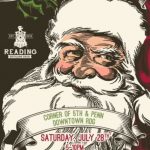“Thank God for the 70% Latino population here. Otherwise, I would not be here. I can go to El Puente for tacos, I can buy Mexican food, I can buy Pan Dulce. I hear Spanish on the streets. I can communicate with my students in Spanish. It’s comforting.”
Pat Uribe-Lichty, youngest child of a Mexican mother and a PA Dutch father, acknowledges her older siblings despair of her because she speaks Spanglish. But, she says, “I can communicate with people.” And Spanglish creates a connection with her GED students, the vast majority for whom Spanish is their first language. “If they are not getting something I will just switch to Spanish and when I do, there is this huge sigh of relief, they just relax.”
Pat relates to that sigh of relief. Growing up in the Harrisburg suburbs, “I didn’t know any other Latinos,” she explains. That void heightened her appreciation for extended visits with her maternal relatives and her high school experience in Venezuela. And then. . . she moved to New York City where she delighted in the variety of cultures and ways of being human.
During her decades in NYC, Pat was a Community Organizer and Gay Rights Activist. “Most of my friends were Black or Latino. . . and everybody I knew was political.” Meaning? “For example, we just knew things. Like the first rainy night in NY when my friends of color huddled in a doorway while I, who look white, hailed a cab and then they ran out. Just because you shut it out doesn’t mean it isn’t happening and you should use your privilege to have an impact rather than to keep yourself safe.”
It was also in NYC that Pat first taught GED math. She was 19, living in a commune, and one of the elders told her to show up at a meeting. That meeting led to her teaching formerly incarcerated folks at The Fortune Society. For the 5 decades since, she has continued to be a math tutor.
“I love working at RACC because the students are really dedicated. Most start out with the idea that they can’t do math, that they are not good at it, and once they learn to add without using their fingers it proves to them that they can do it. Mostly they learn that they CAN DO IT, they just were never taught . . . I’m in awe of the courage that my students show, the courage to try again to do something that they think they can’t do.”
If not for the fact that Pat made a choice to step back from social justice work when she turned 65, she might be actively organizing efforts to: increase funding for GED/adult learning, enact a municipal ID in Reading, or make childcare more accessible to parents seeking to complete their education. Instead, she continues to inspire her students by helping them realize they can do something they think they can’t, and the rest of us with this encouragement: “You should use your privilege to have an impact rather than to keep yourself safe.”
Pat moved to Reading in 2006, to be here with and for her older siblings (and their children and grandchildren) who made this community their home in the last half of the 20th century. In the end, Pat confesses, “I’m a New Yorker. I moved there when I was 19 and it was the only place on earth where I felt like I could actually belong. I really do miss New York in a lot of ways.” And yet, she reflects, “There are many things I really like about my life here.”
About our logo: designed by José Joel Delgado-Rivera, Public Relations and Marketing Consultant.
This project is funded by a FARO grant provided by a partnership between the Wyomissing Foundation and Barrio Alegría. Produced in conjunction with BCTV.




